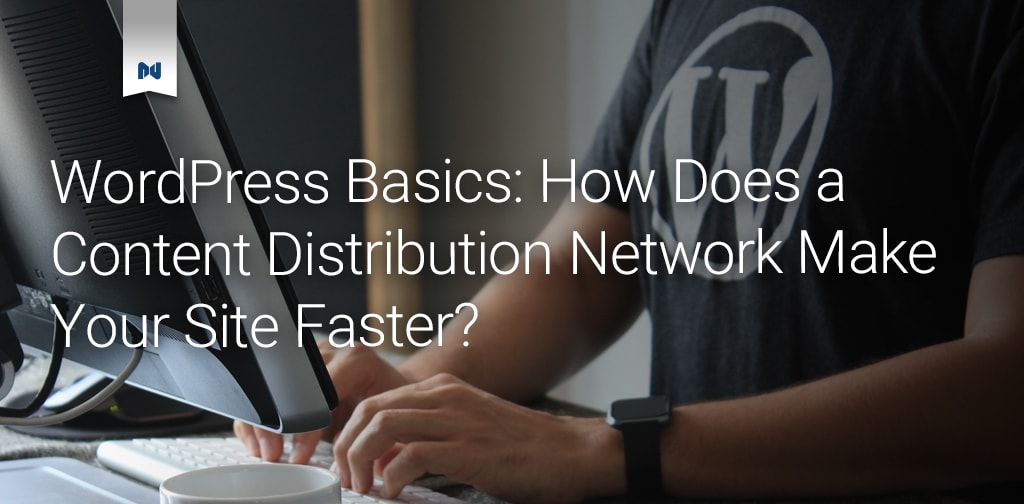Performance-optimized web hosting is the single most important factor in determining site speed. Without that, your site is going to be slow no matter what other optimizations you make. Considering the importance of hosting, many site owners are left asking — why use a CDN?
The fact is that good quality web hosting is a necessary component of a low-latency site, but it’s not sufficient. For example, the fastest web hosting can’t accelerate a badly coded site with huge unoptimized images and a ton of social media widgets. A decent optimization strategy can fix all of those issues, but there’s still one thing no amount of on-site optimization can improve: the round-trip time for geographically distant web clients.
Many people hold the misconception that Internet communications travel at the speed of light. Sometimes they do, but only if they’re traveling over radio waves to satellites or other wireless communication scenarios. In fiber optic cables, signals travel somewhat slower than the speed of light in a vacuum — the reason is complex — and in copper cables they are significantly slower.
It’s a fact of physics that no amount of optimization can overcome. And packets don’t travel in a straight line from server to browser. They go through numerous switches and routers along the way, each of which slows them down a little. The further a site’s server is from the browser, the longer packets are going to take to traverse the network.
So, if we can’t make the speed of light faster, we have to find another way of reducing the round-trip time. The solution is an obvious one: move the server closer to the browser. Of course, you can’t move the actual server every time someone requests a page from a long way away — we haven’t invented teleportation just yet (although we’re keeping our fingers crossed).
What Is A Content Distribution Network, And How Does It Work?
Instead of physically moving the server, we use a content distribution network (CDN). CDNs work by creating copies of the information on a site and sending it to a server closer to the user. One of the main advantages of CDN is that we can make dozens or even hundreds of copies of the site, or some parts of the site, and put them on servers all over the world. These servers are called edge nodes.
When someone in Australia wants to look at a site in the US, the signal isn’t sent all the way across the Pacific and back. Some clever DNS technology recognizes the request is coming from Australia and routes it to one of the copies of the site that is in a nearby data center. In a nutshell, that’s how a content distribution network works.
Why Use A CDN With WordPress?
A CDN is going to improve the speed of your WordPress site, give your site a boost in SEO rankings, and improve your security and uptime. These are just a few of the benefits of CDN for WordPress site owners. Let’s take a closer look at how these improvements might be well worth it.
Better User Experience
Users consistently report speed as one of the most important factors when evaluating their time spent on certain websites. If your site is not loading in under a second, users are more likely to report a negative experience.
By caching your site’s content in edge servers that are closer to those users, you’re decreasing their load time and improving the most important aspect of their user experience. Of all the advantages of CDN, faster site speed is the most impactful.
Improved SEO Rankings
Faster speed also has some positive ripple effects for your site and its users. Search engines such as Google and Bing use site speed as criteria for determining rankings on their results pages (SERPs). The faster your site, the higher you might rank when users perform relevant searches.
Of course, site speed is one of many factors used to determine SERP rankings. Keywords, meta data optimization, and back end factors will play a big part. However, any SEO boosts provided by faster site speed still very much counts as CDN benefits.
Better Security
It’s important to note that the benefits of CDN aren’t all about site speed. Content distribution networks can also protect against malicious network traffic and improve your site’s security.
When setting up your CDN, enabling SSL will encrypt connections between your origin server and its network of edge servers. And, many CDN providers have taken steps to fight DDoS attacks with their own security improvements.
Improved Website Uptime
A CDN will inherently improve your site’s uptime by taking some of the load off of your origin server. Most of a site’s bandwidth is tied up in its images. By storing that static content in a network of servers instead of just one, you’re freeing up bandwidth in your origin server and decreasing the likelihood of costly downtime.
Content Distribution Networks and WordPress
So, to review — why use a CDN? The main benefit is faster site speed, but there are also many secondary benefits, such as better SEO and site security. These benefits make CDNs a no-brainer for many WordPress site owners.
Although that all might sound complicated, it’s not too difficult to integrate a content distribution network with a WordPress site. The W3 Total Cache plug-in makes it straightforward to add a content distribution network to WordPress and Nexcess offers our own CDN. It is integrated into our platforms for easy use without a ton of configuration complexity. For all other aspects of performance-optimized web hosting, check out our solutions and make the most of your site with Nexcess.

